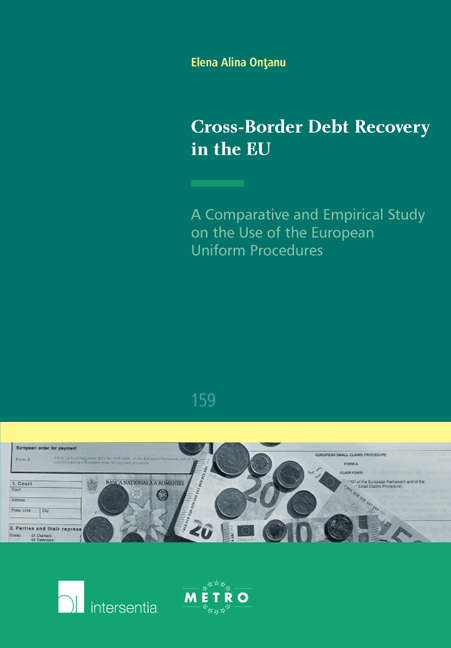 Cross-Border Debt Recovery in the EU
Cross-Border Debt Recovery in the EU Book contents
- Frontmatter
- Acknowledgements
- Contents
- Abbreviations
- Chapter 1 Introduction
- Chapter 2 A European Perspective on the EOP and the ESCP
- Chapter 3 England and Wales
- Chapter 4 France
- Chapter 5 Italy
- Chapter 6 Romania
- Chapter 7 Comparative Perspectives on the Functioning of the EOP and ESCP
- Chapter 8 Conclusions
- Samenvatting
- Annex
- Bibliography
- Table of Cases
- Curriculum Vitae
- Ius Commune Europaeum
Chapter 3 - England and Wales
Published online by Cambridge University Press: 11 October 2018
- Frontmatter
- Acknowledgements
- Contents
- Abbreviations
- Chapter 1 Introduction
- Chapter 2 A European Perspective on the EOP and the ESCP
- Chapter 3 England and Wales
- Chapter 4 France
- Chapter 5 Italy
- Chapter 6 Romania
- Chapter 7 Comparative Perspectives on the Functioning of the EOP and ESCP
- Chapter 8 Conclusions
- Samenvatting
- Annex
- Bibliography
- Table of Cases
- Curriculum Vitae
- Ius Commune Europaeum
Summary
Introduction
England and Wales (hereafter referred to jointly as England) share a common set of rules governing civil procedure. England is a common law jurisdiction, relying not only on the application and interpretation of primary and secondary legislation but also on the use of precedent. Theoretically, the courts ‘merely interpret the law’, but, in practice, judicial decisions contribute to the law, developing it and establishing binding interpretations of the legal provisions. According to Andrews, the sources of English civil procedure are: (1) the primary legislation; (2) the statutory instruments (such as the Civil Procedure Rules); (3) practice directions; (4) the pre-action protocols; (5) judicial decisions; (6) court guides to practice (e.g. Chancery Guide, Queen's Bench Guide); and (7) inherent jurisdiction.
The Civil Procedure Rules 1998 (CPR) are the result of Lord Woolf's Reforms following the 1995 and 1996 Reports on Access to Justice. They are the largest source of English procedural rules, and govern the practice and procedure to be followed before the civil division of the Court of Appeal, the High Court, and the County Courts. These rules sought to address the complexity of the justice system and its funding, as costs of litigation had become unaffordable. They continued to be excessive, and the reform was generally thought to have increased them. Thus, subsequent steps were taken to address this concern. Sir Rupert Jackson's report on the cost regime resulted in April 2013 in recommendations that introduced significant changes to a number of procedural topics in order to ensure the proper implementation and understanding of the Woolf civil justice review. Nevertheless, successive increases in court fees and cuts in legal aids have led to a decrease in the number of cases and to an increase in litigants in person, which hinders case management and results in serious procedural delays. The English system is not designed for litigants in person. Therefore, a new action is being led by Lord Justice Briggs to redesign the system, which will allow many cases to be undertaken without lawyers and on the basis of information technology. Reforms are far from over, however, and will surely continue in the effort to diminish litigation costs and to provide reasonable access to justice for ordinary people and small businesses that ‘struggle to benefit from the strengths’ of the English civil justice system.
- Type
- Chapter
- Information
- Cross-Border Debt Recovery in the EUA Comparative and Empirical Study on the Use of the European Uniform Procedures, pp. 57 - 110Publisher: IntersentiaPrint publication year: 2017
